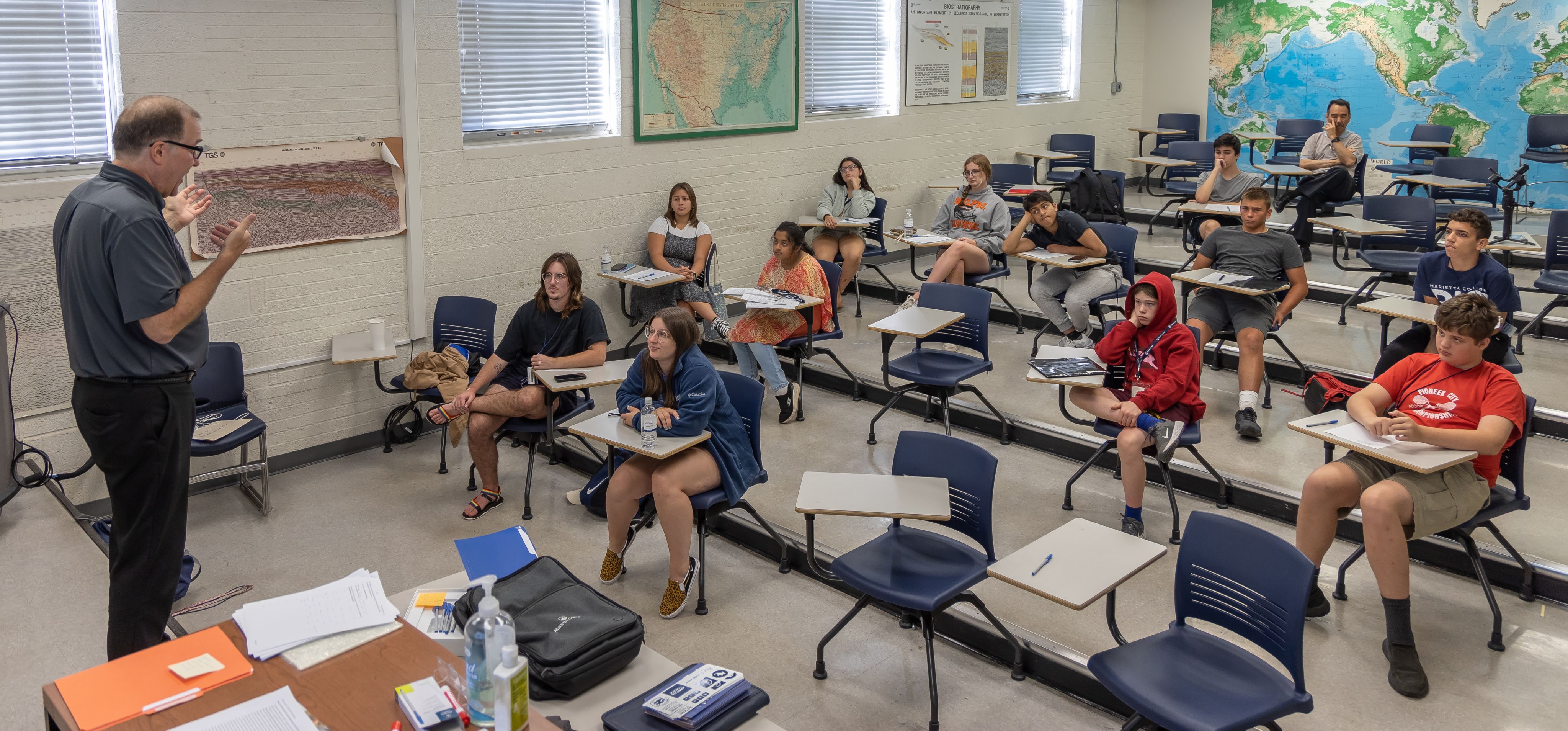The Journal
Alumni and Campus News

Title IX Success Story
Kim Becker Chavers ’08 ready for fourth season as Michigan State’s rowing coach
As colleges celebrate the 50th anniversary of Title IX during the 2022-23 academic year, it has become clear that the women who pioneered athletics on campuses in the 1970s, 1980s and 1990s were more aware of the impact of the landmark federal legislation.
Kim Becker Chavers ’08 considers herself lucky to be more aware and appreciative of how so many people before her had to fight for equal treatment.
“I think I was a little more aware of (Title IX) because my dad was a high school athletic director, and I got to see what he did to improve women’s athletics,” Chavers says. “When we moved to Egg Harbor Township, New Jersey, my high school had a co-ed soccer team, and early-on my dad set out to have a girls’ team so the school could provide this opportunity.”
Chavers is also a shining example of the positive impact of Title IX as she will begin her fourth season as the head rowing coach at Michigan State University, which is celebrating its 25th anniversary this season.
“If you had asked me when I was a student at Marietta College if this would have been a goal of mine or if I thought this would happen, I probably would have laughed,” she says. “The experience I had at Marietta prepared me well for being a professional coach. My teammates and coaches were extremely supportive during my time there and beyond. It has been really cool to see some of the coaches I had at Marietta out now as colleagues at races.”
Chavers earned a Bachelor of Science degree in Health Science from Marietta and then earned her Ph.D. in Physical Therapy from Northeastern University in 2012. However, to earn some money, Chavers began coaching as the boys’ varsity head coach at Bishop O’Connell High School in Arlington, Virginia. Then she served as the novice girls coach at Boston Latin School from 2009-11 and was also MIT’s club rowing coach during the 2010-11 season.
“My first full-time coaching position was as an assistant coach at Stetson University in Florida, and I was the assistant for both the men’s and women’s programs,” she says. “That was one of the first times I really had to recruit in the Division I model. Some of it was trying to learn on your feet and some of it was utilizing the resources you have.”
Before arriving at MSU, Chavers was an assistant coach at Old Dominion University, helping guide the Monarchs through their inaugural season in the American Athletic Conference. Her first two seasons with the Spartans were negatively impacted by COVID-19.
“We came back from our spring break training trip (in 2020), and everything was canceled, and the students were sent home. That following summer it looked questionable on whether sports were actually going to start and would the university even open,” she says. “I’m grateful that Michigan State had the ability to support student-athletes coming back and competing that year. But it was hard for all our student-athletes and the staff with all the precautions and trying to keep everyone safe. We were testing numerous times a day at some point. I kept track for a while, and we reached a point where we had been tested over 5,000 times. It seemed so crazy that we were going through that much to play sports.”
This past spring was the first time many of her rowers got to experience a typical college season.
“My freshmen and sophomores had never really competed, and their families did not have a chance to see them compete at the collegiate level,” Chavers says. “Then this year started and to be able to go to that first race and to have family and friends there to cheer them on and to be able to race teams from the East Coast and the Southeast and the West Coast that we hadn’t seen in years it was such a more normal experience and an enjoyable one for our team.”
Chavers is embracing what she learned at Marietta and bringing much of it to East Lansing, Michigan.
“Marietta has such a long tradition of rowing — both men’s and women’s. That was something that was very present in my experience there,” she says. “So, over the last three years I have been trying to showcase our program’s history more. When you go into the Marietta boathouse, and even more now that it has been renovated, you see the photos of the crews and the recognition of the accomplishments of your predecessors. That was not entirely demonstrated here, so I spent a lot of time finding old photos and sharing that history with the team and making connections with alumni and family and friends of the program.”
While Chavers says the positive impact of Title IX is apparent to her every day, but she still sees ways things could be improved.
“When we travel as a team and we only have one male staff member, and oftentimes people who don’t know our program — someone who works at a restaurant or a hotel — will walk up to our male staff member thinking he’s the head coach,” she says. “It’s moments like that where Title IX has done a lot to support women, but more needs to be done to help normalize women in these types of roles.”
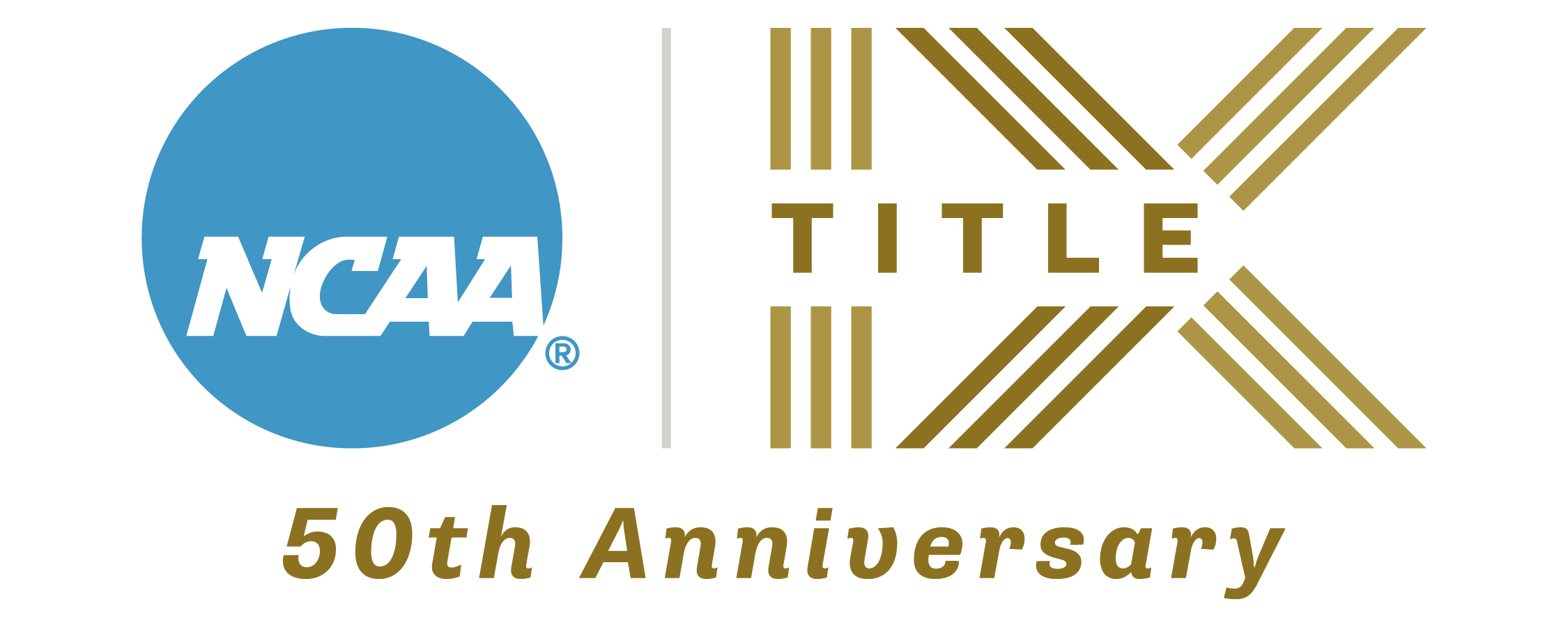
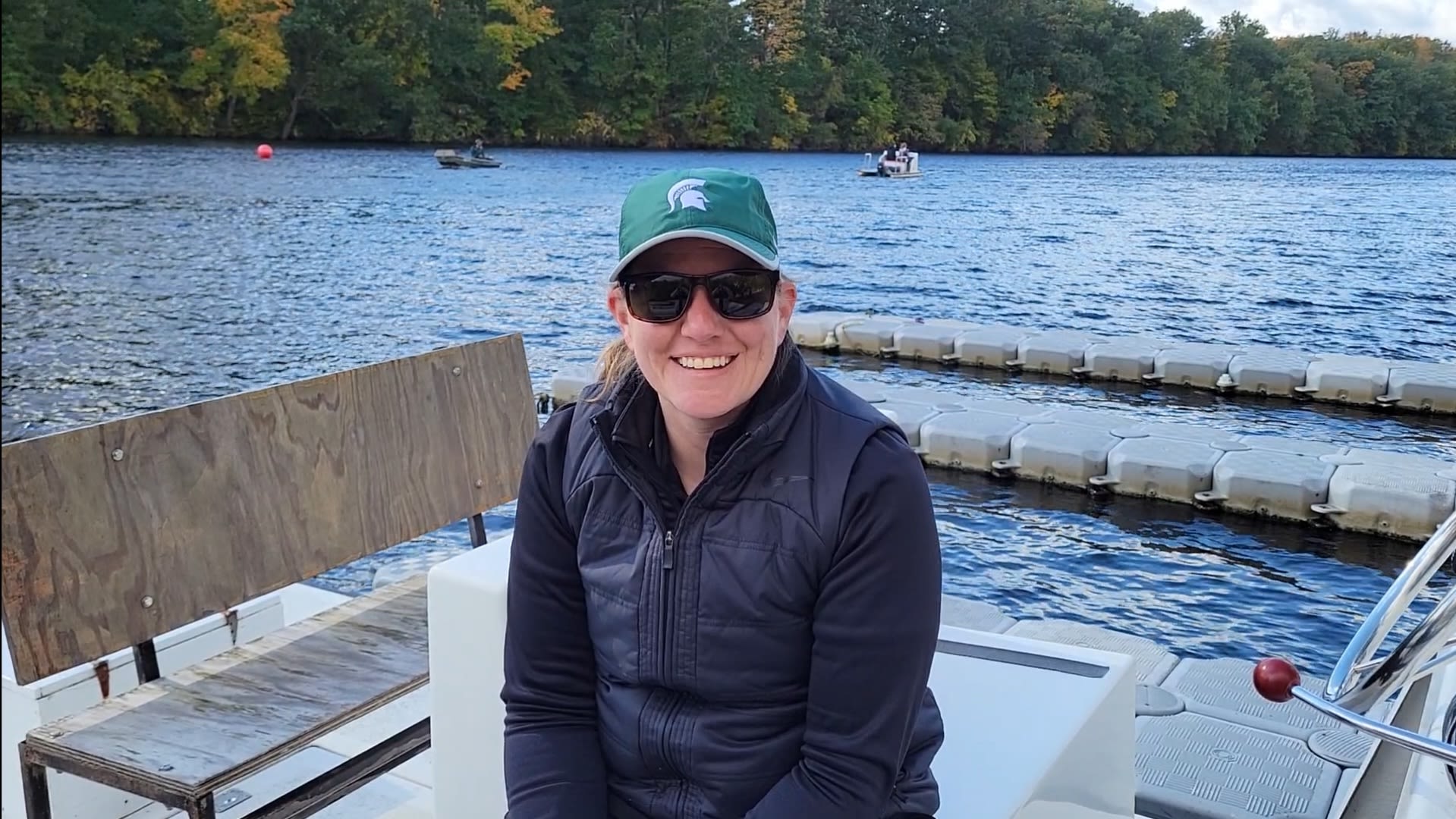
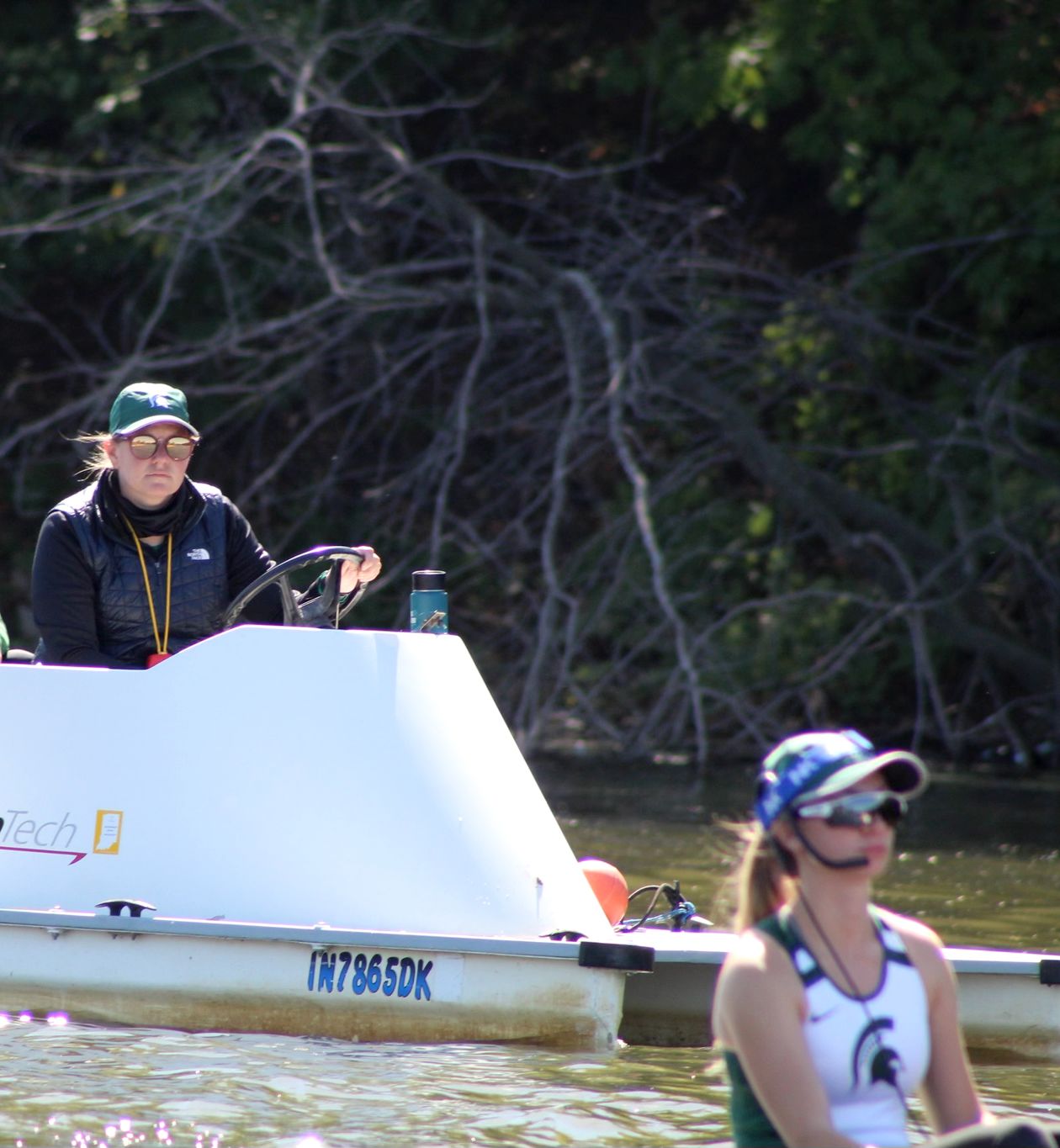
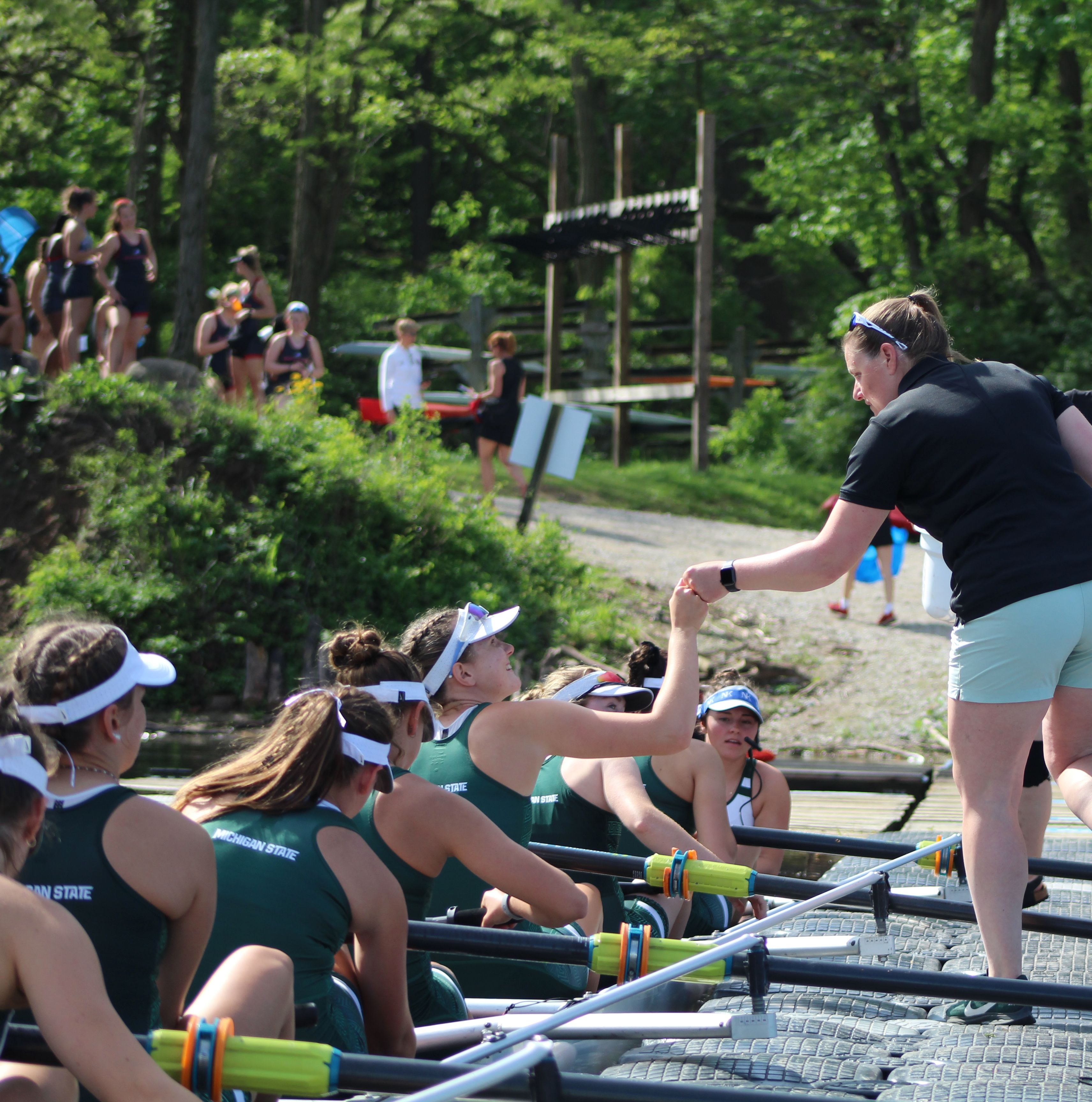



Planetary Science student cherishes internship with Lunar and Planetary Institute
Emily Etheridge ’23 wants a career that moves beyond her interests in physics and science. A conversation with her first academic advisor, Associate Professor Dr. Ann Bragg, led her to become Marietta’s first Planetary Science major.
“I like physics and doing the math, but being able to do the hands-on aspect — being able to actually look at rather than abstractly think about things — is really exciting for me.”
After completing an Investigative Studies project last summer with her current advisor, Dr. Andrew Beck, who leads the Planetary Science program, she was ready to pursue a challenging and highly competitive internship with the Lunar and Planetary Institute. She applied last November and learned in March that she was one of 12 undergraduate students nationally selected for the 10-week internship. The Birdville, Rhode Island, native spent from June 6 through August 12 in Houston, Texas, with her team at LPI. She also served as a contractor at NASA’s Johnson Space Center.
“I am current looking at the thermal history of enstatite chondrites. Enstatite chondrites are a highly-reduced (low in oxygen), sulfur rich meteorite group that are the closest isotopic match to the composition of Earth,” Etheridge says. “More specifically, I am using the minerals plagioclase, clinopyroxene, and orthopyroxene to find out how the planetary bodies that these meteorites come from formed and cooled. They either formed as Earth did, with a distinct core, mantle, and crust, or they started to form this way and were broken apart before reforming because of its gravity.”
She is in the same building as the Astromaterials Research and Exploration Science group. Her internship paired her with mentor Dr. Brendan Anzures, and with co-mentors Dr. Francis McCubbin and Dr. Cyrena Goodrich.
Etheridge was excited to earn the internship, partly because the work that it entailed was in line with what she learned from her mineralogy and petrology courses at Marietta. Similar to Beck, her interests lie in meteorites and how they tell the story of the formation of the solar system.
“Dr. Beck has been super-helpful in the process of applying for and getting this internship,” she says. “He guided me last summer on my (Martian Moon Xploration Phobos moon) project and gave me the freedom to do the research my way so I could develop those skills on my own.”
At Marietta, Etheridge is involved in a wide variety of activities and academics. Though she started as a Physics major with an Astronomy minor, she changed to a Planetary Science major with a minor in GIS/GPS and a Certificate in Leadership Studies. She is also a member of Greek Life and is on the women’s lacrosse team.
“I really love being at a small school where I can do all my professional stuff and also be involved in a sorority, and being involved in athletics and leadership — I get a little bit of everything, which definitely helps you become more well-rounded.”
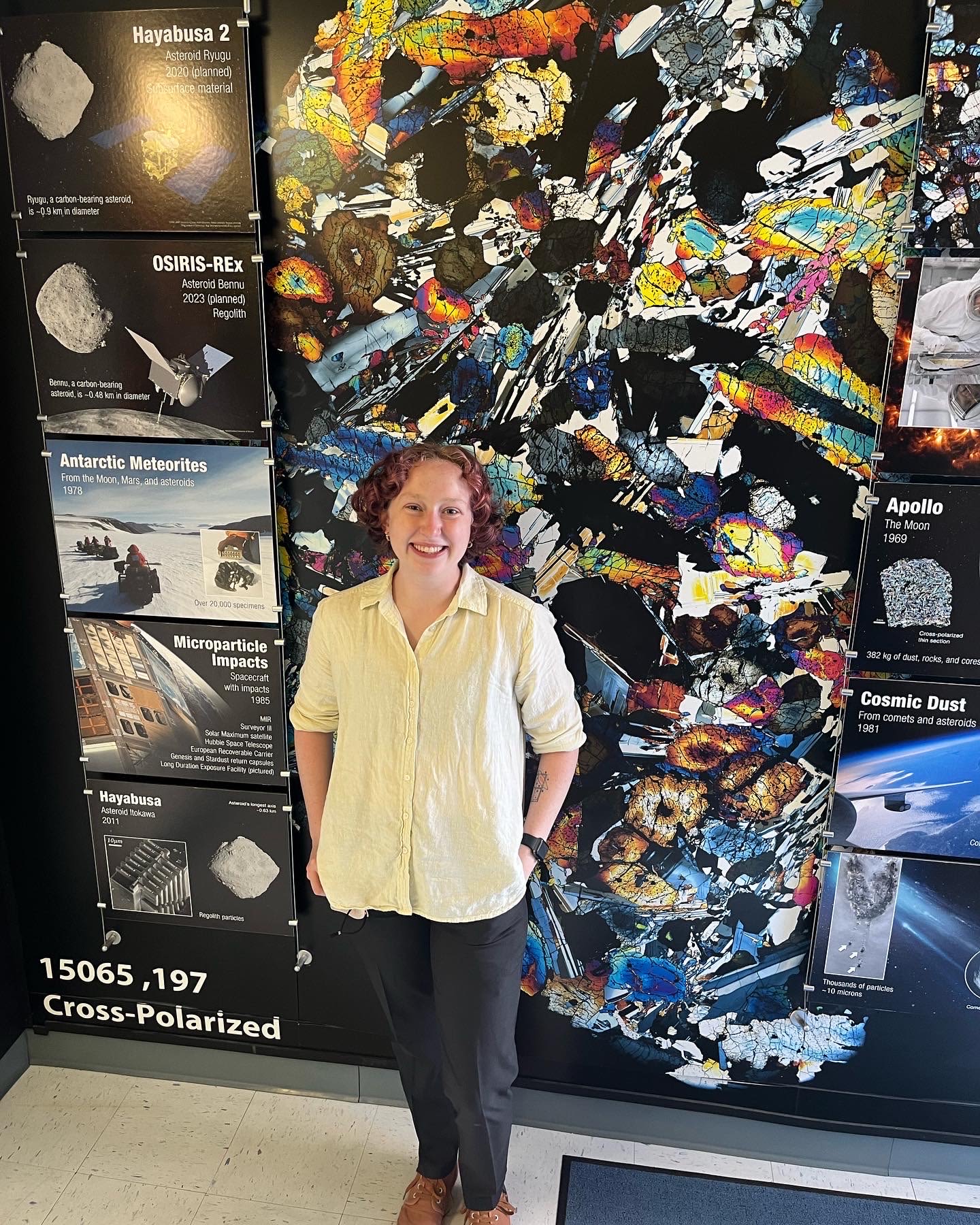
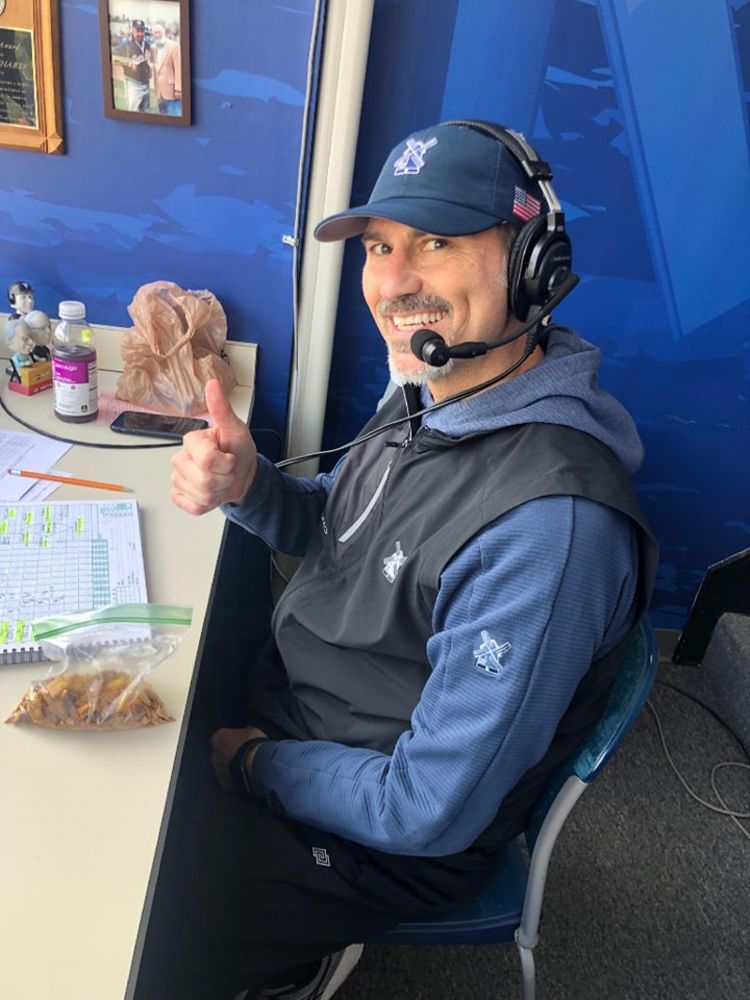
Mark Bradley
Mark Bradley
Remembering Mark Bradley
Though he wasn’t an alumnus of Marietta College, Mark Bradley had the spirit of a Pioneer.
Bradley was a Marietta local who served on Marietta’s Board of Trustees from 2007-2012 and was named a Life Associate Trustee. During that time, he was the President of Peoples Bank, and later became the President of Magnum Magnetics.
Though his leadership on the Board was remarkable, many Marietta College students, employees and alumni knew him best as the color commentator during Marietta’s baseball and basketball games, which he worked with John Wharff and WMOA Radio.
“We will miss Mark in this tight-knit community,” says Marietta College President Bill Ruud. “He was a leader and a very important supporter of both the College and the city.”
Bradley is survived by his wife, Tammi, and their two children, Emilee and Gabriella.
Camp makes a return to in-person fun
Campus came alive in June with the sounds of students laughing, learning and even drawing on the sidewalks with chalk.
They weren’t your typical college-dwelling students — in fact, none of them were old enough to drive. The Education Department hosted the first in-person STREAM Camp since 2019. The three-week camp was themed “Citizen Scientist,” with many of the activities based on the book “Ada Twist, Scientist,” by Andrea Beaty.
Five Marietta College Education faculty, five Education interns, and seven local teachers participated in the event, which focused on 112 campers who ranged from entering kindergartners to sixth graders. STREAM — which stands for Science, Technology, Reading, Engineering, Art and Math — helps students improve their reading abilities and communication skills and boosts their attitudes about reading.
“Campers also enjoyed a chemistry magic show, as well as participated in wellness and team building activities. We are thankful for the support of our doners and the community. Teamwork made this camp a success,” says Dr. Amanda Rider, Assistant Professor of Education.
The children attended camp from 8:30 a.m. to 3:30 p.m. Each child received books related to their interests and at their reading level.
Education majors who interned for academic credit during the camp were Kayla Kearns ’23, Colton Abate, Sydney Westbrook, Bailey Jackson ’23 and Roji Odari ’23.
“They were amazing and it was such a great experience,” Rider says. “Next year our interns will serve as grade level team leaders with a focus on team building and social/emotional learning. The academic content specialists will teach their designated content area for all grade levels.”
College hosts engineering camp for high school students
Dr. Juan Carlos Ramirez Dorronsoro knows that exposing high school students to the variety of careers and skills required to work in STEM fields will give them a better idea which area interests them most.
This summer, he and several fellow professors hosted the Engineering and Geology Summer Camp so interested students could have a five-day camp experience learning about environmental engineering, petroleum engineering and geology. The camp was offered in July to about two dozen students and was supported by Marietta College, the Parkersburg Area Community Foundation, and the Ohio Environmental Education Fund.
“The students attending this year’s camp were exposed to a combination of technical lab and fun activities in addition to education to prepare for a college education,” Dorronsoro says.
In addition to faculty in Marietta’s science and engineering programs, two undergraduate students also worked the camp.
Each day of the camp, students focused on hands-on learning and lecture from 8:00 a.m. to 3:00 p.m. The afternoons were spent outside of the lab and classroom, visiting the Anderson Hancock Planetarium, walking downtown and playing games on campus.
“The students now know in more detail what academic skills are required for these careers, and take an informed decision when they have to decide what to do after they finish their high school education,” Dorronsoro says. “Selecting a career can be overwhelming when you do not know the details.”
Noted author, historian with ties to Marietta passes away
Pulitzer Prize-winning author David McCullough brought the national spotlight to Marietta College when he researched what would become a No. 1 New York Times best seller, The Pioneers, with the help of Legacy Library’s Special Collections.
Sadly, McCullough passed away on August 7, 2022, at his home in Hingham, Massachusetts. His death comes about five weeks after the loss of his wife 68 years, Rosalee Barnes McCullough.
“David McCullough had a gift of researching American history and creating books that brought those stories to life so everyone could read, learn and enjoy,” says Marietta College President Bill Ruud. “Marietta College was honored to open our historic collections to David so he could research what would become his final book, The Pioneers. Our thoughts are with his family.”
In 2019, the Bank of America Charitable Foundation made a gift of $250,000 to Marietta College to establish the Bank of America/David and Rosalee McCullough Research Fellowship to support a researcher-in-residence.
McCullough’s final visit to Marietta happened in 2019, after the book was released. He spent time on campus and visited the nearby Mound Cemetery, where some of the men who appeared in his book were buried. He also gave a special discussion in the Peoples Bank Theatre as part of his book launch. During subsequent interviews with the press, McCullough praised Marietta’s Special Collections contents and staff for their expertise and friendliness.
“Marietta College, now that I’ve spent almost three years coming and going from there, I think it’s one of the finest places anyone could go to college,” McCullough said during his interview with CSPAN in May 2019. “I’d be happy if any of my grandchildren wanted to go there, or anybody that has aspirations for almost anything. And the town is infinitely interesting; it’s history everywhere you look. It’s still on one of the most beautiful locations imaginable — right at the confluence of the Ohio and Muskingum rivers.”
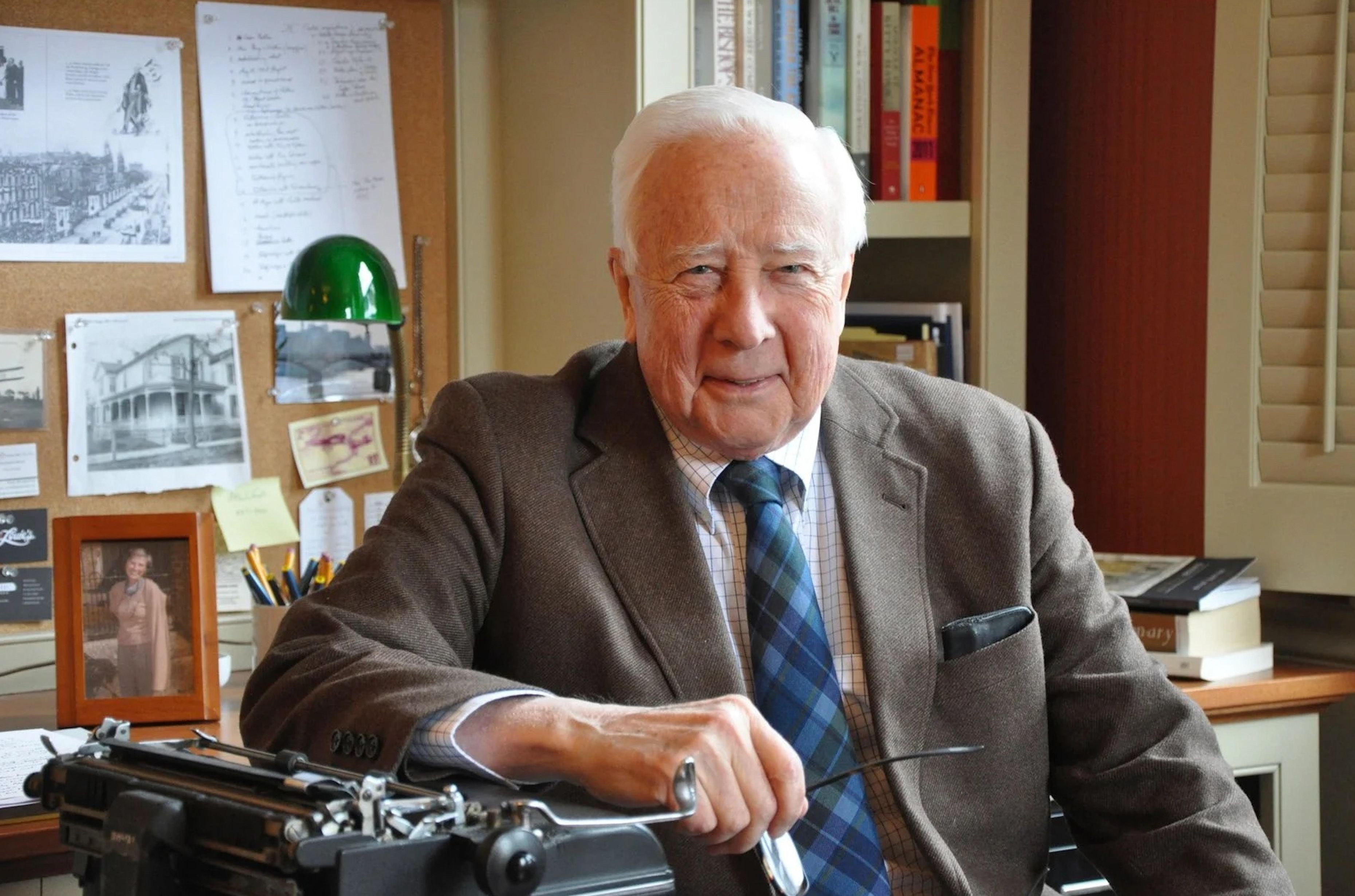
Pulitzer Prize-winning author David McCullough
Pulitzer Prize-winning author David McCullough

